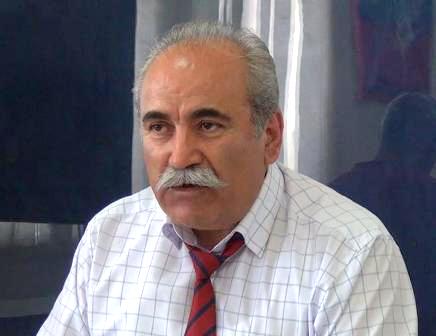 Ten years after the remarkable summit held in Kazan (where Armenia and Azerbaijan were only one step away from reaching an agreement on the principles of the settlement of the Nagorno-Karabakh conflict), third President of Armenia Serzh Sargsyan has transmitted to Sputnik Armenia his article on the events that took place before and after 2018.
Ten years after the remarkable summit held in Kazan (where Armenia and Azerbaijan were only one step away from reaching an agreement on the principles of the settlement of the Nagorno-Karabakh conflict), third President of Armenia Serzh Sargsyan has transmitted to Sputnik Armenia his article on the events that took place before and after 2018.
Presents the article.
The malicious aggression of Azerbaijan against the Nagorno-Karabakh Republic in the fall of 2020 and the consequences of the 44-day war compel to speak out once again about the approaches of Armenian diplomats by which the Armenian government was guided and was understood and supported at the international level before April 2018. The massive protests that were taking place on the streets of Yerevan and other cities and were encouraged within the country and abroad, brought to power people who, with their imprudent and irresponsible actions in the geopolitically difficult South Caucasus, switched on the timer for the gunpowder barrel, and that barrel exploded in September 2020.
I will try to present the main parameters of the difficult diplomatic work that preceded the summit of the Presidents of Russia, Armenia and Azerbaijan in Kazan on June 24, 2011 which could have become, but didn’t become a turning point in the settlement of the Nagorno-Karabakh conflict.
What preceded the Kazan summit?
What preceded the Kazan summit were the intensive negotiations that had been held over the settlement of the Nagorno-Karabakh conflict through mediation of the OSCE Minsk Group co-chairing countries (Russia, USA, France) and especially the President and Foreign Minister of Russia over the preceding three years. I held 14 meetings with the President of Azerbaijan, bilateral and trilateral (with the President of Russia), as well as three dozens of meetings at the level of foreign ministers.
During the negotiations, extensive work was done to agree over the Fundamental Principles for Settlement of the Conflict, the draft of which the Co-Chairs presented to the sides on the sidelines of the meeting of OSCE Foreign Ministers in Madrid in November 2007. After this hard work, we went to the Kazan summit with an agreed draft that contained several major changes.
One of the indicator results of the work is the fact that the 2007 Madrid Document proposed to determine the final legal status of Nagorno-Karabakh through a plebiscite reflecting expression of free will of the population of Nagorno-Karabakh.
Armenia has stressed several times that it will be impossible to achieve a comprehensive and long-term settlement without the participation of Nagorno-Karabakh, and this was reflected in the preamble of the Kazan document which stated the participation of representatives of Nagorno-Karabakh in drafting the draft agreement on a peaceful settlement. This provision was missing in the Madrid Document. Whereas the text of the Madrid Document in November 2007 proposed to start drafting the peace deal right after the Basic Principles were agreed upon by the presidents of both countries, the Kazan Document stressed that the work on the draft peace deal would start after approval of the Basic Principles, meaning this implied approval, including on the part of Nagorno-Karabakh. The Co-Chairs were loyal towards this approach before April 2018.
Diplomacy is a process that doesn’t tolerate populists. In May 2018, when the new and populist leader of Armenia started declaring that he won’t negotiate without the participation of Nagorno-Karabakh, the Co-Chairs accepted this with some doubt. Today, when Aliyev declared that “there is no territorial unit called Nagorno-Karabakh”, the authorities of Armenia are silent.
It is important to stress that the three principles of international law (no use of force or threat of use of force, territorial integrity and the right of nations to self-determination), presented in Madrid, were maintained as a ground for settlement. Moving forward, I would like to particularly stress that ahead of the snap parliamentary elections held in Armenia in December 2018, the new authorities set the principles aside and agreed to resolve the conflict on the basis of the ‘principle of fairness’.
Who led the Kazan Summit to failure?
The summit in Kazan was held at the initiative of President of Russia Dmitry Medvedev, and the Presidents of the United States and France expressed support to the summit. The text presented in Kazan was practically agreed between the sides, and in his letter addressed to the foreign ministers of Armenia and Azerbaijan on June 20, 2011, Foreign Minister of Russia Sergey Lavrov stated that, as agreed, the sides won’t propose changes in the text of the Basic Principles during the upcoming meeting.
Although the international community had great expectations, there was no turning point during the summit in Kazan since, at the last moment, Aliyev proposed more than ten changes, mainly in the agreed text. In Kazan, Azerbaijan actually challenged the international community, and this didn’t strengthen its positions in the negotiation process.
After Kazan
After 2011, until 2018, intensive negotiations continued. Moreover, all the elements in the Kazan Document concerning the final status, interim status, security guarantees, corridor and other provisions, remained in the focus of negotiations since they were insisted by the international mediators.
Failing in terms of diplomacy after the summit in Kazan, Azerbaijan escalated the tension in the conflict zone, with the hope to force the Armenian sides to be less demanding. The peak was the large-scale aggression against Nagorno-Karabakh in April 2016, and the aggression failed since Baku asked for ceasefire through Moscow.
Azerbaijan didn’t come close to achieving its political and military goals during the war in April 2016. It failed to impose its approaches by force, and the results of the summits held in Vienna in May 2016 and in Saint Petersburg in June 2016, as well as the several statements by the Co-Chairing countries of the OSCE Minsk Group reaffirm this.
I have stated several times that I made a difficult decision to stay in power as Prime Minister in 2018 and lead the negotiation process to a ‘dignified solution’, and I wanted to leave secure and thriving Armenian states for the generations. In the spring of 2018, we had all the preconditions for this, and there was mutual understanding with the Co-Chairs.
However, the irresponsible populists and their foreign patrons succeeded in destroying the foundations of Armenian statehood, weakened the country and deeply split the society, and this conveyed new air to Azerbaijan’s diplomacy. I have talked about the consequences of the criminal war that Azerbaijan unleashed with Turkey’s direct support in September 2020 and stated why it was impossible to prevent or stop it, but an in-depth study on this is a different topic.
The Nagorno-Karabakh conflict can’t be settled without a solution to the issue of exercise of the right of nations to self-determination. Nagorno-Karabakh can’t be a part of Azerbaijan.
The international community must not recognize the results of the Turkish-Azerbaijani aggression. It must make efforts to achieve a real, comprehensive and long-term settlement.
The current authorities of Armenia, which are ready to do anything to maintain power, are trying to show that the ‘former authorities’ are responsible for the tremendous and tragic losses that Armenia and Artsakh suffered. It’s clear that it’s impossible to make these authorities responsible for getting the country out of this situation.
Some forces, and first the Azerbaijani-Turkish tandem, are trying to maximally capitulate the results and consequences of the last aggression against Armenia and Artsakh and impose so-called ‘new realities’ on the Armenian society, but the future of the South Caucasus and the establishment of long-term peace and stability in the region can’t be built by ignoring the national interests of Armenians. This seems secondary to the incumbent authorities of Armenia, which have turned Armenia and Artsakh into an object for bargaining in order to maintain their positions. However, this is a priority issue for Armenians in Armenia, Artsakh and the Diaspora.







